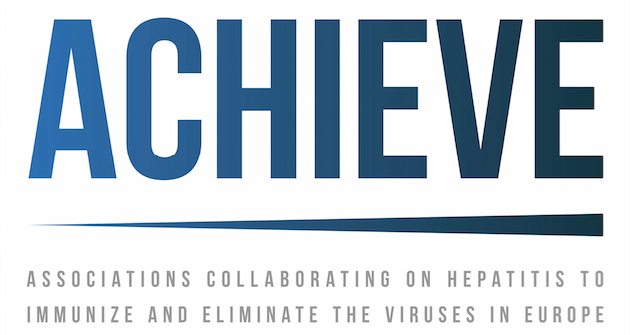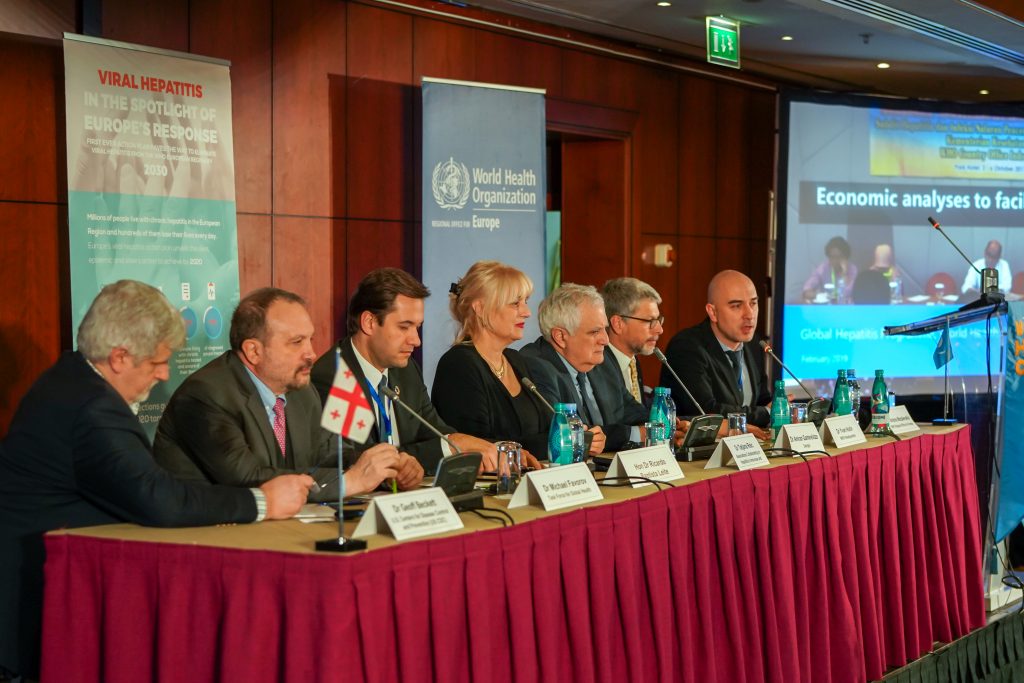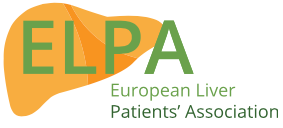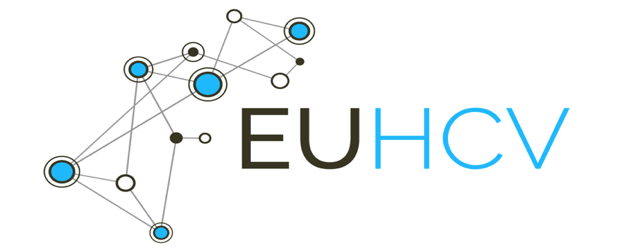3 JANUARY 2024
ACHIEVE Call to Action for the new EU legislature 2024-2029
Viral hepatitis B and C are two deadly viruses whose burden is greater than HIV/AIDS and Tuberculosis combined.
According to the WHO Global Strategy from 2016, which builds on the UN Sustainable Development Goals (SDGs), viral hepatitis B and C can be eliminated by 2030. An effective vaccine exists for hepatitis B, and affordable, easy-to-administer, effective treatments are available for both hepatitis B and C. For hepatitis C, the cure rate is almost 98% and, in the absence of a vaccine, treatment in addition to the harm reduction measures serves also as prevention for virus transmission. Hepatitis B vaccination also prevents co-infection hepatotropic viruses, such as hepatitis D, which puts patients at risk.
However, the EU as a whole is not on track for elimination, leading to significant inequalities across Europe. This is nothing short of a tragedy for those infected, those at risk of becoming infected, their families, Europe’s health and social systems, and the economy. This tragedy can and must be prevented.
Read the ACHIEVE Call to Action for the new EU legislature 2024-2029 to find out more about the key obstacles to viral hepatitis B and C elimination, the EU mechanisms that exist and can help, and which actions the different actors (Member States, Stakeholders, European Commission and European Parliament) can take to eliminate viral hepatitis B and C in the EU/EEA.
ACHIEVE Call to Action for the new EU legislature 2024-2029
8 MArch 2022
ACHIEVE Calls for the submission of good practices in the fight against viral hepatitis

In late 2019, ACHIEVE issued its “Stories to inspire: How national, regional and local initiatives are helping to achieve viral hepatitis elimination”, a collection of good practice examples from across Europe.
A lot has happened since then, with the COVID19-pandemic unfolding and claiming the attention of decision-makers for the past two years. Learn more…
26 July 2019
PRIME

A new hepatitis C tool kit (PRIME) has recently been launched. It contains step-by-step guides to facilitate overcoming stigma and increasing patient engagement in screening, treatment, and self-care of hepatitis C.
Please find below the links to the tool kit in several languages.
English | French | German | Italian | Spanish
20 May 2019
Spring Testing week / EU Elections
This year’s Spring Testing Week overlaps with another important event: The European Parliament elections from 22 to 26 May. Watch and listen to ACHIEVE’s message to the new EU policymakers!
11-13 February 2019
ACHIEVE asked to speak about the role of partnerships at the WHO Europe First Regional Consultation on viral Hepatitis

45 Member States representatives from the WHO European Region, along with leading experts, members of civil society organisations and patients’ associations gathered to assess progress on the road to eliminating viral hepatitis by 2030. Learn more…
12 November 2018
Panel discussion event on 4 December 2018: “EU 2019-2024: How can we support viral hepatitis elimination in line with the WHO Global Strategy and UN SDGs?”

A facilitated panel discussion with EU policymakers and stakeholders will be held on 4 December from 14.30h-16.30h in the European Parliament, room ASP5 E2. Learn more…
27 july 2018
Highest-risk groups left behind in pursuit of viral hepatitis C elimination in Europe

The European Liver Patient’s Association (ELPA) annual update on the state of viral hepatitis C (HCV) policy in Europe shows that many European countries have yet to enact focused policies in pursuit of hepatitis elimination.
20 july 2018
It is time for Europe to step up against Viral Hepatits to meet WHO elimination goal and UN SDGs

ACHIEVE welcomes the European Commission Staff Working Document on “Combatting HIV/ AIDs, viral hepatitis and tuberculosis in the European Union and neighbouring countries – State of play, policy instruments and good practices”.
6 June 2018
Call to Action: Securing sustainable funding for viral hepatitis C elimination plans

Eight organisations committed to the elimination of HCV in Europe call on European decision makers to implement measures to make HCV elimination plans affordable in their Call to Action “Securing sustainable funding for hepatitis C elimination plans”.
14 March 2018
Hepatitis C: the beginning of the end – key elements for successful European and national strategies to eliminate HCV in Europe

On 17 February 2016, the Hepatitis B and C Public Policy Association (HBCPPA) held the hepatitis C (HCV) Policy Summit Hepatitis C: The Beginning of the End—Key elements for successful European and national strategies to eliminate HCV in Europe. The event served as a platform to support the hepatitis elimination campaigns in Europe and culminated in the presentation of the HCV Elimination Manifesto, endorsing elimination of HCV in Europe by 2030.
26 July 2017
Many European countries ‘flying blind’ in their efforts to eliminate viral hepatitis

More people die from viral hepatitis than from HIV, yet the public health response is lacking. The ACHIEVE Coalition urges governments in Europe and elsewhere to improve hepatitis B and hepatitis C monitoring so that a reliable evidence base will be available to guide the drive towards disease elimination.
10 July 2017
MEPs call for strong EU political commitment on eliminating viral hepatitis

Need for an EU-wide Hepatitis surveillance programme, says campaigning deputy, Karin Kadenbach.
Viral hepatitis is a major European killer. Within the 53 countries of the World Health Organization’s European region, almost 30 million people live with either hepatitis B or C. The European Parliament has been at the forefront in drawing attention to the need to tackle the disease. In 2007, it passed a resolution calling on the European Commission and EU governments to recognise hepatitis C as “an urgent public health issue”. A decade on, it is time to take stock. That is why I and fellow MEPs adopted a resolution on the EU’s response to HIV/AIDS, Tuberculosis and Hepatitis C in our recent plenary session on 5 July.
05 July 2017
European Parliament adopts resolution on the EU’s response to HIV/AIDS, Tuberculosis and Hepatitis C

The European Parliament calls on the Commission and Member States to develop a comprehensive EU Policy Framework addressing HIV/ AIDS, tuberculosis and viral hepatitis. It also calls on the Commission, under the direction of the ECDC, to launch a multidisciplinary plan, in coordination with Member States, which will standardize screening, testing and treatment protocols, and which will eradicate hepatitis C by 2030.
The ACHIEVE coalition strongly supports the adoption of this resolution.
09 June 2017
New coalition calls on the EU to take action to eliminate viral hepatitis by 2030, in line with WHO Strategy

Launched at an event in the European Parliament today, the ACHIEVE (short for Associations Collaborating on Hepatitis to Immunize and Eliminate the Viruses in Europe) coalition calls on the EU to take action to eliminate viral hepatitis B and C by 2030 in the WHO European Region, in line with the WHO Global Health Sector Strategy on viral hepatitis, the WHO Europe Action Plan, which build on and the UN Sustainable Development Goals (SDGs).
09 June 2017
EATG joins new coalition calling on EU to take action to eliminate viral hepatitis by 2030

Launched at an event in the European Parliament on 7 June 2017, the ACHIEVE (short for Associations Collaborating on Hepatitis to Immunize and Eliminate the Viruses in Europe) coalition calls on the EU to take action to eliminate viral hepatitis B and C by 2030 in the WHO European Region, in line with the WHO Global Health Sector Strategy on viral hepatitis, the WHO Europe Action Plan, which build on and the UN Sustainable Development Goals (SDGs). The ACHIEVE coalition comes together to speak with one voice representing patients and community, clinicians and researchers.
09 June 2017
HepBCPPA joins new coalition calling on EU to take action to eliminate viral hepatitis by 2030

Launched at an event in the European Parliament on 7 June 2017, the ACHIEVE (short for Associations Collaborating on Hepatitis to Immunize and Eliminate the Viruses in Europe) coalition calls on the EU to take action to eliminate viral hepatitis B and C by 2030 in the WHO European Region, in line with the WHO Global Health Sector Strategy on viral hepatitis, the WHO Europe Action Plan, which build on and the UN Sustainable Development Goals (SDGs). The ACHIEVE coalition comes together to speak with one voice representing patients and community, clinicians and researchers.
‘The ACHIEVE coalition is enabled by the support of Abbott, AbbVie, Cepheid and Gilead Sciences’.
